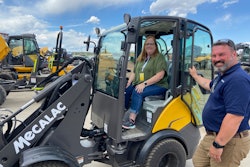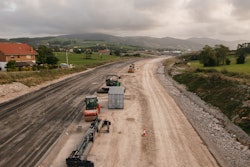
My father handed me a black trash bag and my career in masonry began. I was 9 years old.
Fast forward many decades, and my masonry career has moved across the country, into celebrities’ homes, and most recently, into a passion for helping other contractors in hiring.
Throughout my career, the threads of mentorship, passion and collaboration have helped me to differentiate myself and my business. Here’s a few of the lessons I’ve learned along the way.
Lesson No. 1: Benefits in Balance
My father would then assign me the job of sorting different rocks by sizes: golf ball-sized rocks here, softball here and basketball there. That then turned into the fun stuff: laying brick.
Between the ages of 12 to 14, I really got hands on, and even began running crews. It really kicked off when I went to a vocational high school and studied masonry and concrete, gaining a true understanding of the materials.
My father told me about SkillsUSA, a great national skilled trades competition for young students. If I got gold medals in the school, district, state and/or national levels, I’d get a raise. I ended up placing second at nationals.
Though my humble beginnings in masonry looked like my father’s — given that he was the third-generation owner of DiBara Masonry (and I’d become the fourth) — the old way versus the new way truly came to a head at this time.
Nothing was wrong with the old school way necessarily, but finding a harmony between the old and new became a longstanding thread through my career. My dad’s old school mentorship methods would be what pushed me to improve my skills and drive, my new goals for changing the company would take DiBara Masonry to different heights.
Lesson No. 2: Old School Knowledge Can Differentiate You
My dad was modern with tools and products, but wasn't as modern with advertising and marketing sales technology. That was an area where we butted heads because I saw the shift of the internet and what it would do to business.
But what’s important is not dropping one way of doing business or work entirely, it’s more so integrating the two. Don’t forget to fall in love with your materials. Don’t forget to find out about the best products and why they’re better.
For example, we used to mix our own mortar and concrete colors. And so, when it came later for color kits with little samples, you could do it easier, but then it became a hard job to match. I was still the go-to guy because I know how to custom mix colors. I think there's an opportunity in construction for us to really understand and respect our roots.
Lesson No. 3: Always Be a Neighbor
Much farther back than my father’s ownership of the company was my great grandfather’s. An immigrant from Italy, he grew his business through three values: an honest day’s work for an honest day’s pay, never try and retire off one customer and most importantly, treat customers like they’re your neighbor.
When I decided to move the family business from Boston to California, I followed those same values. What that looked like was over delivering and doing the small things, like taking client’s trash out. Digging up trees or flowers, I’d go to other customers and ask if they had interest in the flowers.
I had to start from the bottom. And so, the only thing that could stick was showing up and following through on all my promises.
Lesson No. 4: Confidence is Your Best Trait
Confidence is what got me into doing celebrity work.
There was a job at a very well-known celebrity’s home, and they had a leak in their pool. I told him and he said, “I’ve had five companies come out, and you’re just this young kid. There’s no way I have a leak.” Well, I responded with, “I’ll hire the leak company, pay $3,000 out of pocket to run a full evaluation. If there’s a leak, you reimburse me and hire me to do the work.”
He hired me and that was one of the breakthroughs into high-end clientele. Since then, I've done a lot of celebrity homes and built a reputation around our company that we get it done, once we get it done right. We also do a lot of large government projects, such as the Veterans National Cemetery, where we laid 6,000 or more pieces of granite.
Lesson No. 5: Finding Fulfillment in Mentorship
I’m a big believer in mentors. Today, I am a mentor for others in hiring and retention, but that all began with a mentor of mine, Damian Lang. While searching for the future of my company, I reached out to a local association seeking a mentor.
Lang is a Mason Contractors Association of America (MCAA) Hall of Fame inductee. He owns five companies, ranging from masonry to manufacturing, and invited me to stay with him for a few days to see his operations. He showed me that I could maintain the current success and size of my company and find the fulfillment I wanted, which would be helping other contractors. The breakthrough I had with Lang was, “Oh, you can get different types of fulfillments from different businesses, and you can run multiple companies.”
Lesson No. 6: Learn from Your (Hiring) Mistakes
A few years prior, I was given a massive wakeup call: My company began losing nearly $1 million. We couldn’t hire enough skilled workers to complete jobs on time. So, I devoted all my time and energy to figuring out a solution to the problem, studying other industries, company culture, and the modern hiring market.
While I found an answer through a mentor, I was solidifying my passion in helping contractors. I knew I could do both, and took my lessons learned in hiring into consulting contractors on their own hiring challenges.
The knowledge I gained came from old lessons, doing just as my great grandfather did, and incorporating new elements, such as technology.
Lesson No. 7: Share Your Knowledge
Balancing old with new, leaning on mentorship, and diversifying my experience in masonry has led me to both run a successful masonry company and a successful consulting company I am passionate about.
Preaching a lesson of sharing knowledge as a mentor, I can’t leave you without a few hiring tips:
- Dedicate time in hiring. If you’re looking to fill jobs, you need to dedicate more time each day to doing so and following a proven system. Hiring is like baking a cake. If you’re off in a measurement, or forget to spray the pan, the entire thing is thrown off.
- Invest in your team. One of my best marketing tools right now is my fantastic team. You need to look at investing in your team as a revenue-generating activity, not just putting a body into a slot.
- Understand your needs. The first step in our hiring course is ensuring you have a clear understanding of who you need for the role by analyzing and auditing your current team, down to their daily tasks. For example, high pay often equals high skill, but you could have a project manager picking up plans, dropping off samples, and their output is greatly reduced because of that.
- Evaluate your team and competitors. We first look at optimizing before maximizing because sometimes you don't need to hire anybody. Sometimes you restructure the role and you're like, “Oh, actually, if we take out this component, we'll just promote Tom.” It all begins with an internal audit, then auditing your competitors to see what they’re doing for hiring.
Lesson No. 8: Culture, Culture, Culture
To leave you with a last nugget of knowledge, I must mention something about company culture. Reigning in hiring helps culture and it helps the bottom line.
It allows us to offer people more money and make their jobs more manageable. There's nothing more exciting to me than when my team loves what they do.
It's partly because of the non-traditional pay scale that I learned growing up with my dad. He gave me a raise when I honed my skills and performed well. There's no time limit to learning things. We review often. In your first four months, we do a two-week review, a 30-day review and a 90-day review — all of those are eligible for a raise.
And be sure to answer: Would you work for you? Google yourself. Based on what you see, answer the question. Would you be excited to work for your company? Showcase who you are, what makes you unique and why they should work for you.
As an owner, it’s helped me spend time with my family and round out my life personally. I couldn’t have done any of this before because of how reactionary it all was.
Everything I have learned in my decades-long masonry career is reflected in these eight lessons: Put your culture first, learn from your mistakes, share your knowledge, be confident, believe in the old and new, and always be a neighbor.


















